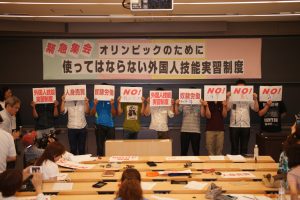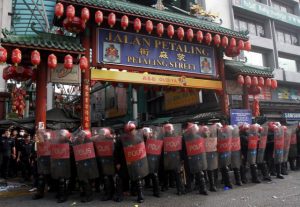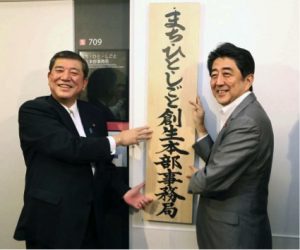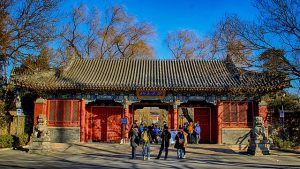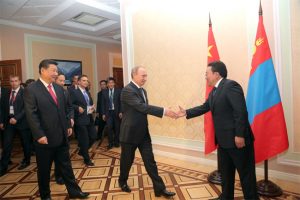Human rights for human resources – Japan debates and expands the controversial Technical Internship Training Program, once more
Memo #343 By: Daniel Kremers – kremers [at] dijtokyo.org Intense debate currently surrounds the Technical Internship Training Program (TITP), Japan’s major source for lesser skilled temporary migrant workers, just five years after the last major revision of immigration laws in 2010. The program consists of three years of employment in manual jobs in mostly small and medium […]
Has Chinese foreign policy in Southeast Asia entered a bolder and more assertive phase?
Memo #342 By Kai Ostwald – kai.ostwald [at] ubc.ca With the major exception of the South China Sea, China’s political presence in Southeast Asia has been low profile in recent decades, if only because it has chosen to project power indirectly through economic might and behind closed doors. Its response to recent events in Malaysia, […]
Red Star Over Asia: Taking Stock of Xiaomi’s Meteoric Ascent
Memo #339 By Grégoire-François Legault – gregoire.legault [at] alumni.ubc.ca Increasingly, tech products will be “designed in China” as opposed to “made in China.” Xiaomi 小米, a Chinese consumer electronics manufacturer, represents a new era of innovation in China that will increasingly enable indigenous tech companies to compete head-to-head against established firms from the most advanced […]
Amidst its Tragedy, Nepal’s Strategic Dilemma
Memo #333 By Tsering Shakya – tsering.shakya [at] ubc.ca Although previous studies have argued that international/donor agenda drives disaster risk reduction (DRR) in Nepal and strengthens the role of NGOs vis-à-vis the government, there are clearly differences in international influences by country, a fact made notable in the cases of China and India. Nepal’s fear […]
Regional Vitalization: Japan at the Crossroads
The Heisei mergers are long done and Japan has turned to vitalizing its rural economy. The question is whether such a policy will work. Memo #331 By Anthony Rausch – asrausch [at] cc.hirosaki-u.ac.jp The current focus on regional vitalization by the Abe Cabinet reflects Japanese concern with its dropping rural population and Tokyo-centered economy. The […]
A New Look at Chinese Liberalism among Elite Students
Memo #330 By Fen Lin – fenlin [at] cityu.edu.hk Peking University, the traditional locus of Chinese liberalism, seems to be yielding this role to China’s economics and financial universities. A 2012 survey, conducted among six elite universities in Beijing and Shanghai, revealed that only 14% of Peking University students described themselves as liberal reformists, the lowest […]
The Future of the Renminbi and Next Steps for Canada
Memo #328 By Grégoire-François Legault – gregoire.legault [at] alumni.ubc.ca Though internationalization of the renminbi (RMB, the “redback”) is far from complete, it is well under way. In 2014, China signed eight new agreements to establish RMB hubs around the globe, and the redback was used to settle almost 25% of payments across China’s borders. The […]
Integrating Sexual Minorities in South Korea
Memo #321 By Joseph Yi – joyichicago [at] yahoo.com, Joe Phillips – joephillips5 [at] gmail.com, Heather Yang – heatheryang0102 [at] gmail.com The LGBT (Lesbian, Gay, Bisexual, Transgender) occupy a peculiar place in South Korean society. By maintaining somewhat sexually free, separate social enclaves, they avoid significant public backlash and government oppression. However, they have no […]
Mongolia – From Sino-Russian Buffer to Conversion Zone
Memo #318 By Mendee Jargalsaikhan – mendee [at] alumni.ubc.ca Last autumn, Presidents Xi Jinping and Vladimir Putin made separate visits to Mongolia, met for a tri-lateral (Russia-China-Mongolia) summit in the Tajikistan capital of Dushanbe during the leadership summit of the Shanghai Cooperation Organization (SCO), and dispatched their vice-foreign ministers for a working-level meeting in preparation for next […]
‘One Drug with Multiple Names’: Broad Powers and Product Differentiation in the Chinese Pharmaceutical Industry
Memo #315 By Yifan Wang – yfwang [at] essex.ac.uk Drug regulations in China stipulate that chemical and generic names of drugs are determined by the Chinese Pharmacopeia (Ch.P) and the State Food and Drug Administration (SFDA), while brand names are chosen by pharmaceutical companies, as long as they are recorded with the SFDA. Some Chinese […]
